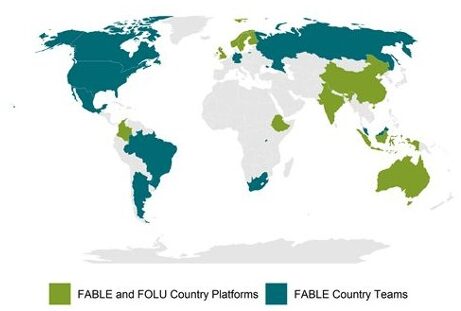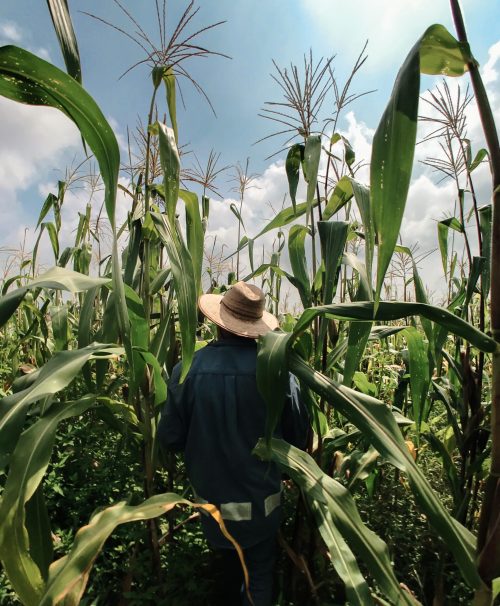Advancing Evidence-Based Decision Making on Land-Use and Food Systems through FABLE México
FABLE México successfully partnered with the Mexican Secretariat of Agriculture and Rural Development to use the FABLE Calculator for evidence-based policy making, strengthening the coherence of land-use and food system decisions.
Claudia A. Fernández-Calleros
Land-use and food systems are crucial to the 2030 Agenda for Sustainable Development as they relate to SDGs 2: zero hunger, 12: responsible consumption and production, 13: climate action, and 15: life on land. Countries working toward these goals must overcome the interrelated challenges of ensuring food security for all while preserving natural resources and reducing greenhouse gas (GHG) emissions from land-use and food production. These challenges require comprehensive analyses of policy alternatives to find the most efficient pathways toward sustainable land-use and food systems. However, few countries have access to reliable tools for such evidence-based evaluations.
The Food, Agriculture, Biodiversity, Land-Use, and Energy (FABLE) Consortium was created as part of the Food and Land-Use Coalition (FOLU) to overcome these limitations. Formed by a Secretariat and 20 country teams, FABLE develops modeling infrastructure to test the impact of proposed policies at the national level through an internationally shared framework. They created the FABLE Calculator, an Excel accounting model that studies the potential evolution of food and land-use systems from 2000 to 2050. Intended for an audience with little or no modeling experience, the FABLE Calculator facilitates key stakeholder engagement.
The Mexican chapter of FABLE (FABLE México) has adapted the Calculator to reflect the country’s public policies and goals, such as dietary changes, constraints on agricultural expansion, and reforestation targets. The Mexican Secretariat of Agriculture and Rural Development (SADER) took notice of this work as it sought to build its forecasting department to analyze the potential impacts of proposed policies related to food self-sufficiency, emissions reduction, and biodiversity conservation.
FABLE México, with support from the SDG Policy Initiative, met weekly with SADER public officials in the past year to find the best collaboration strategy and assist SADER with its forecasting objectives. While this partnership initially only intended to provide SADER with policy briefs based on the Calculator’s results, it progressed to a deeper engagement with SADER’s team as they became increasingly interested in using the FABLE Calculator as part of their modeling toolset. After multiple meetings to train SADER public officials on the uses and limitations of the Calculator, we now work together to further adapt and update the tool to SADER’s priority interests.
The partnership between FABLE México and SADER has been mutually beneficial in various ways. SADER continuously provides constructive feedback on the assumptions and policies considered in the Calculator. Updating the Calculator helped spark a conversation within SADER on the availability and challenges of current key performance indicators for forecasting. Information sharing networks have been strengthened both within SADER and with FABLE México. Training SADER’s team on how to use the FABLE Calculator also highlighted the Calculator’s steep learning curve and potential lessons to facilitate this process, resulting in a series of video tutorials in Spanish covering the Calculator’s objectives, structure, calculation steps, how to define new scenarios or assumptions, and interpreting its results.
FABLE’s Mexican chapter is now a landmark within the FABLE Consortium on key stakeholder engagement. Aware that trust-building and political will from SADER’s team have been central to our partnership’s success, we hope to serve as an example to other public officials and FABLE country teams in Latin America and beyond. Long-term policy coherence among all sectors involved in sustainable land-use and food systems is critical to achieving the SDGs. Sharing ownership and understanding of the modeling tools available to track and estimate our progress is key. The limited experience of many governments in this regard necessitates significant collaboration between public officials and international scientific communities to ensure widespread, effective use of these technologies and methods.
Claudia A. Fernández-Calleros
Claudia is a 2021 Master of Public Policy alumna of the School of Global Policy and Strategy at the University of California, San Diego. In addition to collaborating with FABLE México, she is a consultant to the Center for U.S.-Mexican Studies at GPS on financial inclusion, migration, and transborder cooperation.



